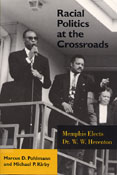Racial Politics at the Crossroads
Memphis Elects Dr. W. W. Herenton

- Author(s): Pohlmann, Marcus D., and Michael P. Kirby
- Series:
- Imprint: Univ Tennessee Press
- Publication Date: 1996-10-31
- Status: Active
- Available in Paper: Price $17.50 | Buy Now
In one of the closest and most racially polarized elections in the history of urban America, Dr. W. W. Herenton in 1991 became the first African-American mayor of Memphis. Racial Politics at the Crossroads is an in-depth case study of that election, exploring the unique circumstances that produced the outcome.
As Marcus Pohlmann and Michael Kirby explain, politics in Memphis had by 1991 reached what they call “a point of racial reflexivity.” One of the key factors that had helped elect black mayors in other cities—a significant level of white liberal support for the African-American candidate—was largely absent in Memphis. Instead, the racial chasm was so wide that it precluded any cross-racial appeals by either candidate, and consequently the mayoral contest between Herenton and incumbent Richard Hackett consisted of parallel campaigns. Rather than engage each other in debate of the issues or the usual pattern of attacks and counterattacks, the two candidates concentrated on turning out and registering their own racial constituencies. Herenton’s success, in the end, hinged on the mobilization of an extraordinary level of black support in combination with critical demographic and legal factors. The authors suggest that the election might easily have gone the other way if, for example, Memphis had been allowed to continue its annexation of predominantly white suburbs.
The authors analyze the election in the context of the city’s history of racial politics and contrast the political dynamics of Memphis with that of other cities. Finally, in an epilogue written in light of Herenton’s decisive 1995 reelection (in which he faced only token opposition ), the authors conclude that bridging the black-white divide in Memphis will continue to be the greatest challenge facing Herenton’s administration but that the most recent election results do suggest that a significant step has been made in that direction.
The Authors: Marcus D. Pohlmann is professor of political science at Rhodes College in Memphis and the author, most recently, of Governing the Postindustrial City. Michael P. Kirby, associate professor of political science at Rhodes, has written extensively for scholarly journals.
